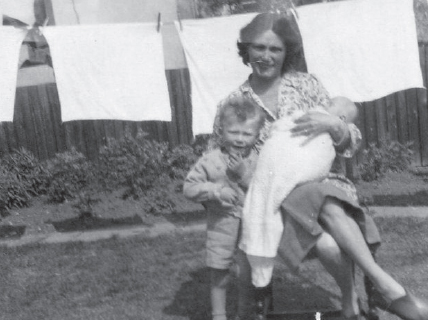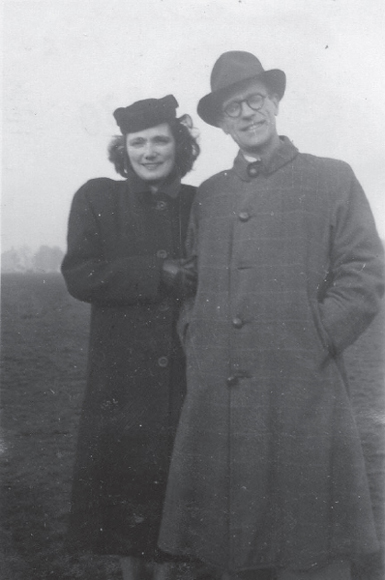My Dear Bessie (46 page)
Authors: Chris Barker

I shall send you a telegram today (Wednesday) telling you âTHURSDAY BREAKFAST', and when night comes, I shall be on my way TO YOU, TO YOU, TO YOU, my Darling, Dear and Precious One.
When you get up, try and put a drop of hot water on, so that I can have the bath, please. Then a little breakfast (how about sausages and tomatoes, or toast and tomatoes), and I will WASH UP FOR YOU! Prepare for the deluge â¦
My telegram will come from York, but I have to return to Thirsk afterwards. We go there only for our civilian clothes, then must retrace our steps after release! Army madness.
DARLING, DEAR ONE, WE REALLY ARE NEAR NOW. WITHIN TWENTY OR SO HOURS, WE SHALL BE TOGETHER, HAVE EACH OTHER.
I probably will make this the last letter. The post for âLunnon' goes from here at 3.30 in the afternoon.
DEAR,
DEAR,
DEAREST
Bessie,
I love you.
Chris

7 May 1946
My Darling,
Well, everything is going well now, and I have all the definite information needed. I shall be home for breakfast on Thursday morning.
Let us only have a light breakfast (for me), as I shall have been travelling and my stomach will be a little upset I dare say. Then, too, let us have only a light lunch that takes little time to prepare, and postpone the âreal meal' until the evening. Shall we? Then there will be no rushing about and we can take things as easily as we like. I don't suppose you will want to start showing me Croydon until Friday. I hope not, as I do, do want to have you to myself entirely for a little while. I suppose we shall be bound to
plan a little bit, but I would like to have a nice three weeks' glide, a drift along, if we could manage it.
Darling, tonight I spend my last night in the Army. Tomorrow I spend the night in the train. As you go to sleep Wednesday night, think of me speeding along the rails towards you, sleeping this final separate sleep. And remember that when you awaken in the morning, it will be to hear my voice and see me.
Dearest, Darling, Only One, thank you for all that you have been to me through these years, and be sure we shall overcome with our love any difficulties there may be later on. I can never be as good as you deserve, but I really will try very hard, and I know you will help. We shall be partners, collaborators, man and woman, husband and wife, lovers.
I love you. I want you. I need you. ALWAYS.
YOUR Chris

*
Auxiliary Territorial Service.
Afterword
by Bernard Barker
I was born thirteen weeks after my father stepped through the door at Ellesmere Drive and was named after my mother's iconoclastic hero, George Bernard Shaw. My brother Peter followed in 1949. We became characters in a post-war story and for almost sixty years were unaware of the letters, romance and drama that had brought us to life.
This changed on a visit to my recently widowed father in 2004. He held out a small blue box and asked: âShall I throw these away, or will you take them?' They were his war letters. He said no one should read them until he and my mother were both dead. Following his instructions, I waited to open the box until 2008.
I pulled out the tightly folded bundles and found 500 individual letters written in a clear, faultless hand on thin blue airmail paper or on NAAFI headed notepaper. I read the half million words over a period of several weeks and immersed myself in a wartime world of love, longing and frustration.
I was in the desert with my dad as he recorded the death of pigs and rats; I was with my mother in London braving bombs and rockets. Through their words they were animated again in my mind â energetic, passionate, clear-sighted, wise and loveable.
I decided to create an archive and to include the war letters with the other papers I collected from my Dad's house when it was sold. Katy Edge, an administrator at the University of Leicester, agreed to type the correspondence.
I sorted and edited the documents and prepared a detailed inventory. We arranged to deposit the results in the Mass Observation special collections at the University of Sussex.

Bessie in the garden at 27 Woolacombe Road with her two sons Bernard (standing) and Peter
My parents' letters describe dangerous adventures as well as lonely tedium, and express the love that grew from their experience of war. I began to ask whether the lives that followed, domestic and child-centred, were an anti-climax, marked by a retreat from passion and the sparkling language that made it.
Dad did not think so. In 1946, with the army behind him, he was delighted with his new wife and son and revelled in his house and garden. He was pleased to be back on the post office counter.
Mother was less settled; after the death of her mother during the war she felt responsible for her brother and father. She was dismayed by their unconvincing attempts at housekeeping at her family home in Blackheath, London SE3. Dad seems to have understood her feelings. So the new family moved in with the old, with Mother to look after us all.
Grandfather sold the Blackheath property to our parents in 1947. When Peter was born, he decided the house was too crowded for comfort and left to join his sister in Surrey. Mother and Dad lived at 27 Woolacombe Road for the rest of their time together.
Mother's brother Wilfred remained, to become an inhibiting presence in his sister's marriage. But Uncle Wilfred's shy, gentle and indulgent nature provided a marked contrast with Dad's energy and austere taste. As a toddler I became the centre of loving attention, with four adults available to talk, read stories and play games.
I have family seaside photographs from the late 1940s, with Mother holding Peter in her arms, and me at her side. My father's lack of Post Office seniority meant that our holidays were taken in
early spring, from March onwards, and our photos tell a story of shivering, windswept beaches on the north Kent coast.
Mother was the constant presence in our young lives, cooking all the meals and greeting us home from school. When we were ill with chicken pox, measles or mumps, she would push two armchairs together in the lounge so that we were not alone upstairs.
She believed in the fundamental importance of education and its role in the development of individuals and their society. She taught us to read (a slow and frustrating process in my case) and had us recite the tables while our teeth were brushed and our knees washed. Later she used
First Aid in English
and mock IQ test papers to improve our verbal reasoning scores for the eleven-plus.
Mother's grammar school education made her useful with homework, especially when we were at secondary school, but tensions would rise as I struggled with algebra and French.
An insomniac herself, she put us to bed very early. We would bounce on the bed, unable to sleep in the evening light and would peep between the bedroom curtains to see the parents working in the garden and our uncle nursing his newly purchased moped, an NSU Quickly.
Mother was passionate and occasionally combative. At times she saw herself as oppressed by the men in her family, including her sons, and promised to argue with us, however successful and well-educated we might become.
She read eagerly all her life, especially philosophy, history and detective fiction. Mother admired writers who did justice to the courage and ability of women, and was devoted to Bernard Shaw, Bertrand Russell and Rudyard Kipling.

Bessie and Chris on Blackheath in the early 1950s
Dad was a tireless figure, always busy with household tasks. He was slightly built, never exceeding ten stones, but seemed mightily strong to us, a vigorous, sweat-encrusted engine turning clay soil in the garden. He had a voracious appetite for weeds, dug potatoes and followed instructions on the location and care of Mother's precious plants.
Eggs were rationed, so he kept chickens in the back garden and had to cope with escaping birds, broody hens, coccidiosis and a huge volume of droppings. He found the cure for feather-pecking: âIt was Stockholm Tar, a very sticky, smelly substance which I applied liberally to the feathers, realising too late that it should have been applied only to the wounds.'
He would tackle the washing-up urgently, rushing us to the rhubarb and evaporated milk before the plates were clear. But Dad enjoyed food, especially the particular favourites he liked to prepare, including the burned pancakes that he called flapjacks, and tinned salmon with grated carrots.
Compared with Uncle Wilfred, who built us wooden battleships and gave us cricket bats, bricks and soldiers, Dad did not seem well equipped for child's play. Once he came home early from work to declare âI'm all yours' but none of us knew what to do next.
Later he said his thinking had been strongly influenced by Mrs Sydney Frankenburg in
Common Sense in the Nursery
. She advised against over-stimulating your children. So our parents gave us books (Arthur Ransome, Robert Louis Stevenson, H.G. Wells) and left the toys, games and sports to our benevolent uncle.
Dad was enthusiastic about his work on the counter and was a keen supporter of the Union of Post Office Workers (UPW). He served at various branch offices, including Shoreditch, and was in charge of 493 Cambridge Heath Road before becoming an overseer in the Western District.
Dad attended fewer union meetings than before the war but wrote over 250 articles for the
Post
between 1954 and 1967. His âCounter Chronicles' provided a humane and witty perspective on the life of the Post Office clerk.
I can see our dad at his Olympia typewriter in an upstairs bedroom, tap-tapping in search of the right word or phrase. In âPromotion Prospects' (1957) he reflected on his own career: âThere are three stages of Post Office man. He joins; he is promoted; he retires. Certain incidents occur before or after these events, but all that matters is concerned with his arrival, his ascension, and his departure.'
Our parents' close partnership could be a problem for us when we wanted to negotiate over TV viewing, homework, pocket money or bedtime. They were indivisible. Even when irritated frowns appeared, they never argued. You could not win.
Mother's passions became more evident when we were both at school. She was engrossed by the garden and grew a tremendous variety of plants. She would lift the head of a hellebore and exclaim âLook, look at that!' as visitors stared at its intricate beauty. At the age of 40 she embarked on a career as an artist.
